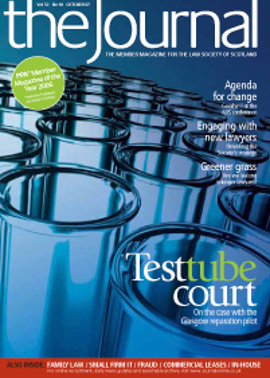Working with OSCR

The Charities and Trustee Investment (Scotland) Act 2005 was passed over two years ago now, but is still often referred to as the “new” law. Perhaps this is an indication that we – charities, professional advisers and regulator alike – have yet to fully understand its intricacies. This should not be seen as a point of shame, but rather recognition that much of the Act represents a considerable change to the legal context that we all work in. Open communication, particularly between OSCR and professional advisers, is key to our working towards a position where the legislation is comfortably embedded.
Consents and notifications
It is unfortunate that we on occasion find ourselves faced with failure to engage with the regulatory regime. A prime example is the frequent disregard of ss 16 and 17 of the Act. Charities that wish to amend their constitutions in relation to their purposes, or that wish to wind up, dissolve, amalgamate or apply to the court in relation to one of these actions, have to seek OSCR’s consent at least 42 days before such action is taken. This allows OSCR to protect charitable assets, ensure that charities act intra vires, and also offer assurance to charities that the changes contemplated will not endanger their charitable status. Perhaps one of the main reasons for non-compliance in the case of trusts is that it is not always recognised that expenditure of all the trust capital has the effect of dissolving the trust.
Drafting practices
We encourage practitioners to revisit their styles and proforma documents. OSCR is happy to look at drafts of revisions to ensure they comply with the Act. There are a number of drafting practices that should be avoided.
One is including in a constitution a requirement to seek the consent of the Secretary of State for specific changes to the constitution, the charity’s dissolution, or the destination of its assets. What was once a common practice intended to safeguard the wishes of trusters or founders, is now proving particularly difficult for charities. Given OSCR’s specific functions – most of the instances for these consents would fall under either s 16 or s 39 – the Secretary of State and Scottish Ministers are understandably disinclined to be drawn into these processes.
An issue that has enjoyed some press recently is the defining of “charity” or “charitable” by referring to either English or tax law, commonly s 505 of the Income and Corporation Taxes Act 1988. Section 7(4)(a) of the 2005 Act is clear that a body does not pass the charity test if its constitution allows it to distribute or apply its property for a purpose that is not a charitable purpose. Where the purposes in a constitution are defined by referring to a source other than the 2005 Act, or where the constitution permits funds – typically upon dissolution – to be used for a purpose defined in such a way, that constitution fails the requirement of s 7(4)(a) and the body therefore fails the charity test. This is equally an issue where the constitution does not contain an explicit definition but will be interpreted under a law other than Scots law. Our website www.oscr.org.uk has a more detailed note on this issue and provides suggested wording to resolve this matter.
A further point that may seem self-evident but is nevertheless worth mentioning, particularly in the context of legacies, is the need to draft for contingencies. One cannot assume that a particular charity will be around indefinitely, or that OSCR would be able to provide an authoritative view as to the successor organisation of a former charity.
Informal opinions
OSCR is regularly requested for “informal opinions” on constitutions proposed for bodies intending to apply for entry on the Scottish Charity Register. Our experience is that while purposes expressed in the draft may well appear acceptable, difficulties can arise when it transpires later that the body’s activities are not in pursuit of these purposes, or cannot be considered to provide public benefit. We are therefore reluctant to provide informal opinions on draft constitutions alone. We would however welcome applications on the basis of the draft constitution with an accompanying statement of activities or proposed activities. This allows us to issue a decision in principle. We will enter the charity in the Register on receipt of the formally adopted constitution.
Reorganisations
The Charities Reorganisation (Scotland) Regulations 2007 are now in force, enabling OSCR to approve reorganisation schemes proposed by charities under s 39 of the 2005 Act. Operational guidance is now on our website. The more clearly practitioners explain what the changes are, why they believe the reorganisation conditions of s 42(2) of the Act are met and how the outcomes set out in s 39(1) will be achieved, the speedier OSCR’s consideration of the application will be.
Marieke Dwarshuis, Head of Charities, Office of the Scottish Charity Regulator
In this issue
- Advocacy in mediation
- Your voice will count
- Does justice need fixing?
- A case for trial?
- The tide for change
- New lawyers for all
- Leaving the profession
- Three proposals
- Options ahead on standards
- Know the need, know the cure
- The file at your fingertips
- Fraud: making your strategy work
- A wider view
- Pub games reborn
- Working with OSCR
- Goal to Leeds
- "We're all doomed" - or are we?
- Website reviews
- Book reviews
- Out of my depth?
- Court bars in-house privilege
- Leases: the war is over?
- ARTL picks up speed






